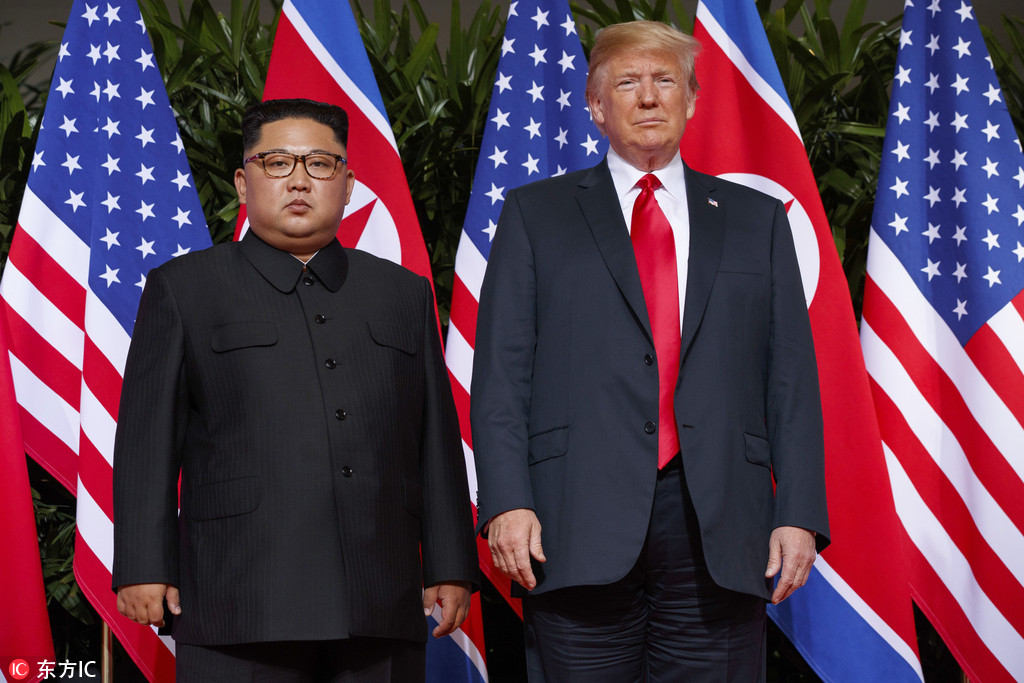Optimistic about Kim-Trump summit
By Hujjatullah Zia | chinadaily.com.cn | Updated: 2019-02-26 14:41

With the second summit between Kim Jong-un and Donald Trump slated for February 27-28, there is hope the two sides will make further headway. But it will not yield a positive outcome if Washington pushes for “permanent, irreversible, verifiable” denuclearization and Pyongyang insists on lifting sanctions.
Since the first meeting, held in June in Singapore, the vaguely worded agreement signed between the two sides for denuclearization was proved abortive despite the statement made in the UN Security Council by US Secretary of State Mike Pompeo that “Chairman Kim committed to work towards the complete denuclearization of the Korean peninsula”. Kim fears “Vietnam model” denuclearization seeking a step-by-step quid pro quo.
With this in mind, a trust deficit still lingers between Pyongyang and Washington. On the one hand, the US side seems skeptical of Democratic People’s Republic of Korea’s seriousness about denuclearization and, on the other hand, Kim doubts the bona fide intention of Trump’s administration for pursuing a tit-for-tat deal. Building mutual trust is believed to be a prerequisite for reaching a fruitful consensus.
It is evident that seeking a package agreement and once-for-all denuclearization in one meeting or two is neither reasonable nor possible. It is unlikely to include all the prerequisites and conditions of denuclearization and Pyongyang’s demands, such as withdrawal of US troops from the Republic of Korea, the lifting of sanctions and guaranteeing the security of the DPRK, in a single package. Thus, a “phased” and “synchronous” approach will be promising.
For instance, the Trump administration seems unwilling to include a quick withdrawal of US troops from ROK in the talks but expects Kim to dismantle his nuclear arsenal “very quickly”, as he told reporters immediately after the Singapore summit.
In the upcoming summit, the negotiating sides have to chart a clear roadmap to delineate the process of denuclearization and lifting of sanctions as well as the demands and responsibilities of each side.
Regional stakeholders expect a more positive outcome of the summit and want both sides to reach an effective consensus. “For example, for DPRK to agree to international monitors checking and reporting on its nuclear weapons and facilities; and for the US to agree partially lift sanctions,” Cheng Xiaohe, a professor of Korean studies at Renmin University, is cited as saying. He reiterated Beijing’s support for the summit, which is a key step towards regional stability.
Overall, the Hanoi Summit will be productive for two reasons. First, from harsh rhetoric and Trump’s “fire and furry”, the two sides sit face-to-face to resolve the insurmountable issue through negotiations. Such reconciliatory approach will put an end to the cold war and mitigate regional stability.
Second, the two sides are hoped to reach an agreement on denuclearization process, lifting sanctions on DPRK, formal ending to the 1950-53 Korean War, giving security guarantees to the DPRK, and establishing new relations between the US and DPRK. Although it is unlikely to have all these issues in a single package in one meeting or two, this summit will be one more step forward to decreasing the cold war mentality as well as regional instability.
Some political pundits call the Hanoi meeting “make-or-break summit” as they doubt its fruition. However, I believe that the summit will bring US and DPRK closer and create more room for optimism and better relations between the two sides. I emphasize that all the issues will not be finalized in this summit and US President and DPRK’s Chairman have to schedule a next summit for finalization.
Meanwhile, if the issues are too controversial, which may hamper them from reaching a consensus, the two sides have to consider engaging regional stakeholders in the talks. For example, China and Russia played essential role in brokering talks between Seoul and Pyeongyang and can continue their role, if they are demanded, to put their weight behind the talks.
An inclusive negotiation with the participation of regional stakeholders will lead to a more sustainable and trustworthy agreement. Moreover, the international community has to push for an inclusive consensus between the US and ROK on the one side and DPRK on the other side and make sure the agreement is practiced by all sides.
The author is an Afghan journalist and freelance writer.
The opinions expressed here are those of the writer and do not necessarily represent the views of China Daily and China Daily website.
























